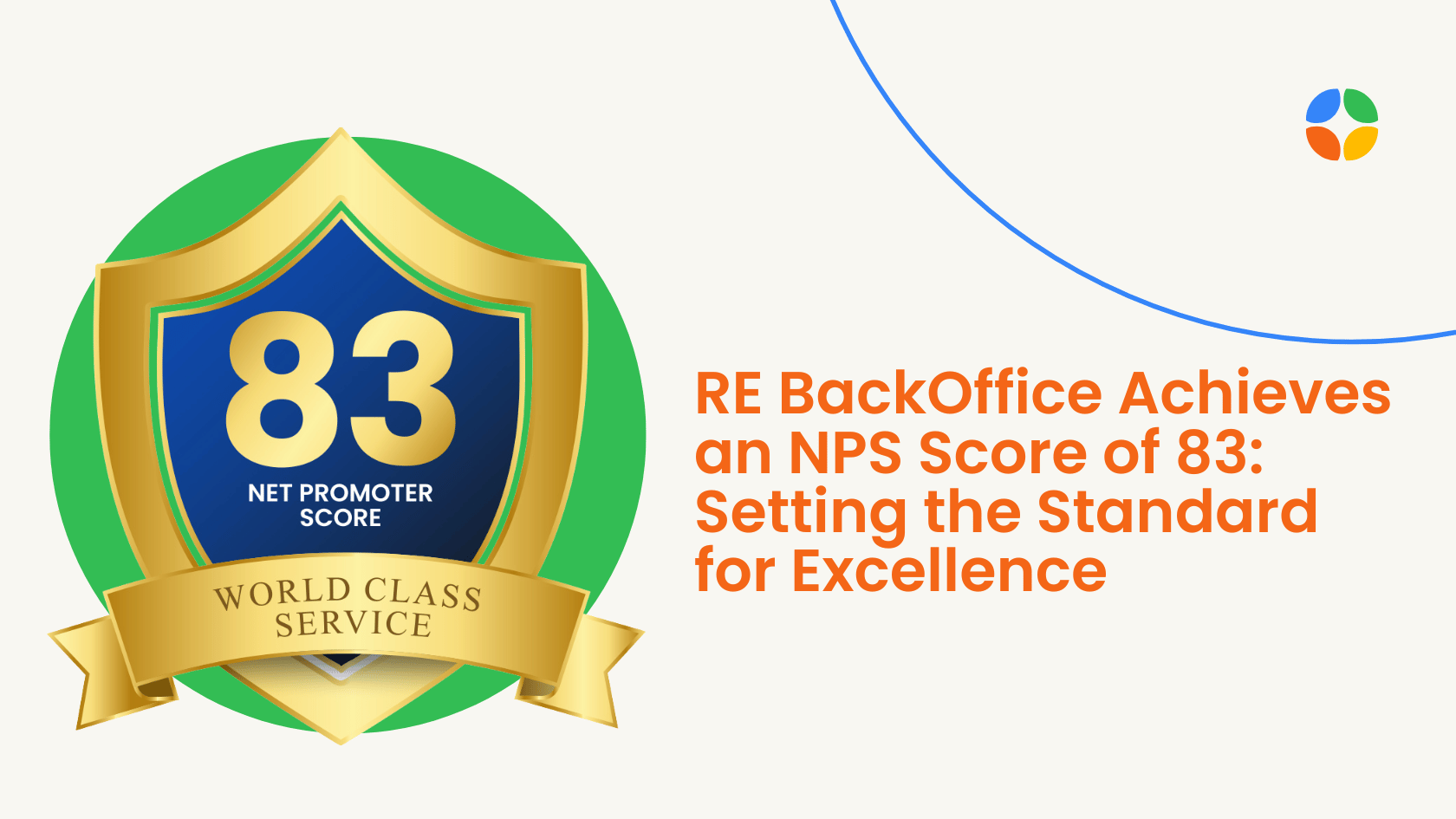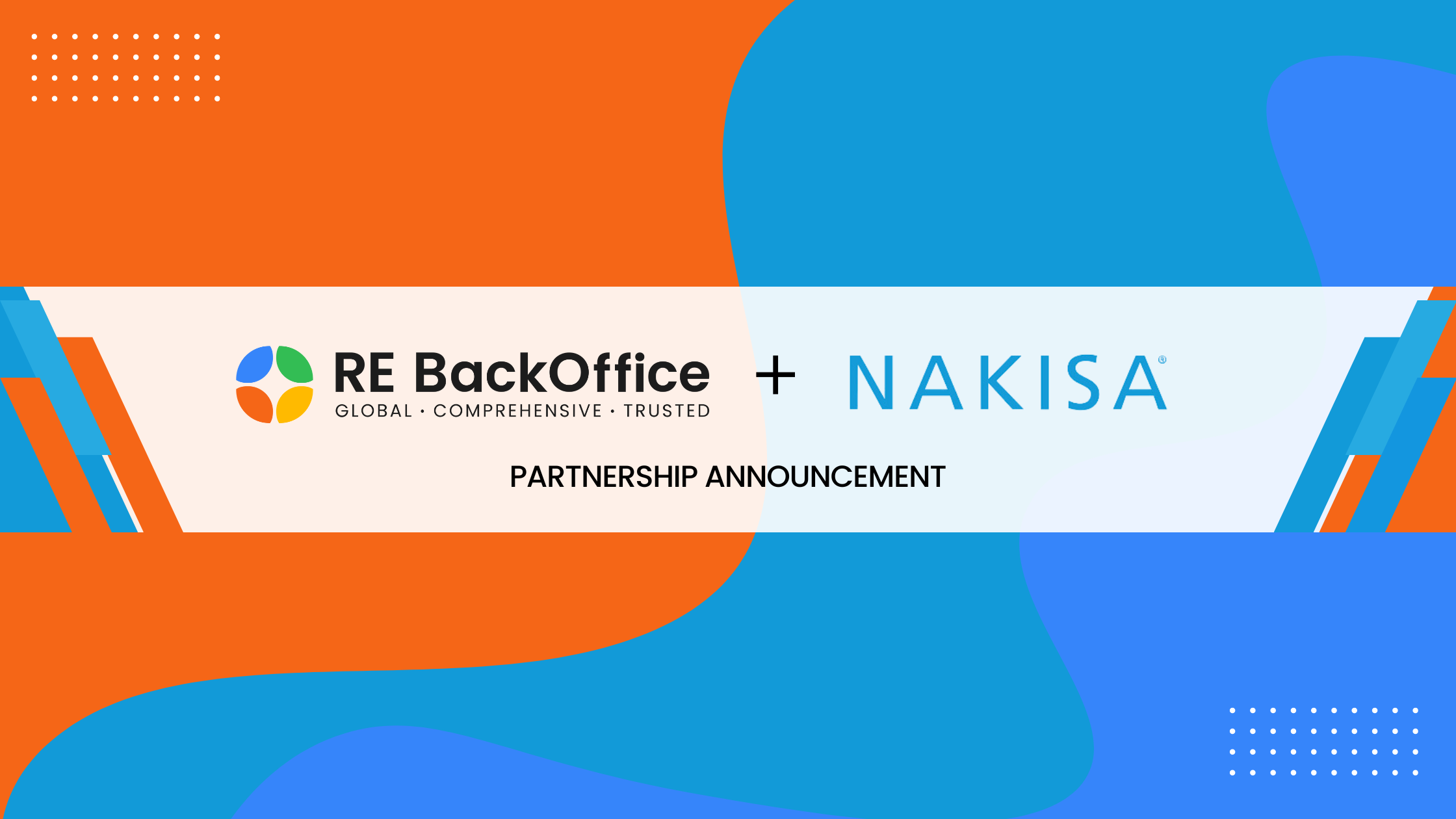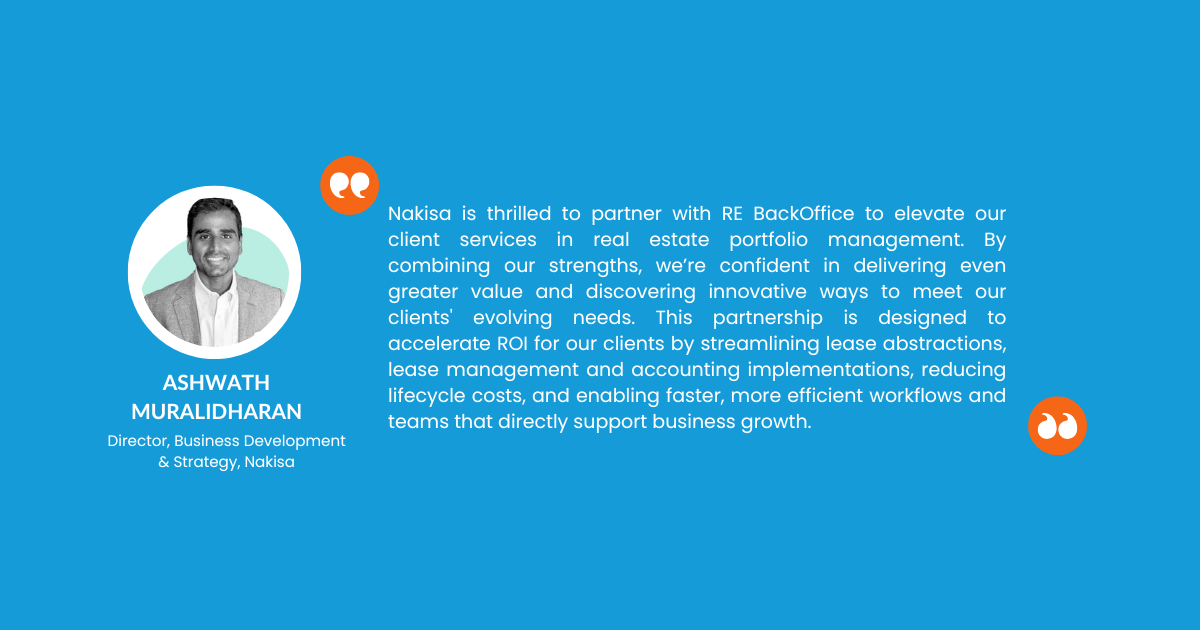
RE BackOffice is proud to have achieved an exceptional Net Promoter Score (NPS) of 83, placing us firmly in the category of world-class service providers.
Our score of 83, on a scale ranging from -100 to +100, highlights our dedication to delivering unparalleled services in lease administration, abstraction, and CAM reconciliation. This achievement positions us significantly above industry benchmarks, showcasing the strength of our client relationships and our commitment to exceeding expectations
What is NPS and Why Does It Matter?
Net Promoter Score (NPS) is a metric used by businesses worldwide to measure customer satisfaction and loyalty. Developed by Fred Reichheld in 2003, NPS has become the gold standard for understanding how customers feel about a company.
The metric is based on one simple yet insightful question:
“How likely are you to recommend our services to a friend or colleague?”
Customers respond by giving a score from 0 to 10, and based on their responses, they are classified into three categories:
- Promoters (9–10): Loyal and enthusiastic customers who actively recommend your business.
- Passives (7–8): Satisfied but not thrilled customers who are neutral and less likely to promote your services.
- Detractors (0–6): Dissatisfied customers who may share negative feedback and discourage others from engaging with your business.
Once categorized, the NPS is calculated using the following formula:
NPS=% of Promoters−% of DetractorsNPS = \% \text{ of Promoters} – \% \text{ of Detractors}NPS=% of Promoters−% of Detractors
This results in a score ranging from -100 to +100:
- +100: The ideal score, achieved when every customer is a Promoter.
- -100: The lowest possible score, meaning every customer is a Detractor.
Our NPS score of 83 demonstrates an exceptional level of customer satisfaction and loyalty. This means the overwhelming majority of our customers are Promoters—actively recommending our services to others.
Why NPS is a Game-Changer for Businesses
NPS is not just another customer feedback tool; it’s a strategic asset for businesses. Here’s why it’s critical:
- Measures Customer Loyalty: NPS provides a clear snapshot of how loyal your customers are. It goes beyond satisfaction by identifying the true advocates of your brand—your Promoters—and highlighting areas where you can improve for Detractors.
- Fuels Organic Growth: Promoters are more than just loyal customers—they’re brand ambassadors. Their recommendations lead to higher-quality referrals, fueling growth through trust and word-of-mouth.
- Enables Benchmarking: NPS allows you to compare your performance against industry standards. A score like ours, 83, sets us apart as a leader in our field and showcases our dedication to excellence.
- Drives Continuous Improvement: By analyzing NPS data over time, businesses can identify trends, address weaknesses, and refine their offerings to better meet customer expectations.
- Our Commitment to Exceptional Service: Our high NPS score reflects our unwavering dedication to delivering services that exceed expectations. But we don’t stop at the numbers. We actively use NPS insights to ensure every client feels heard, valued, and supported.
How We Maintain a High NPS
Our exceptional NPS score isn’t by chance. It’s the result of deliberate efforts in the following key areas:
-
- Personalized Solutions:
Every client has unique needs, and we tailor our services to meet them—whether it’s lease administration, lease abstraction or CAM reconciliation. - Proactive Communication:
We believe in transparency and keeping our clients informed every step of the way. Feedback is always welcomed, and we address concerns promptly. - Relentless Improvement:
We don’t rest on our laurels. NPS feedback is our guide for continuous improvement, ensuring we stay ahead of client expectations. - Leveraging AI for Scalability and Efficiency: AI helps us scale quickly, meet tight deadlines, and manage large volumes of data while ensuring accuracy. This technology allows us to deliver efficient, timely services to our clients.
- A Strong Focus on Quality—Human and Technological: While AI enhances efficiency, our human quality control processes ensure that every task meets our high standards. This balance between technology and expertise guarantees top-tier results.
- Experienced Team with Over 10 Years of Collective Expertise: With an average of over 10 years of experience, our team brings deep industry knowledge to every project. This expertise enables us to exceed client expectations.
- Personalized Solutions:
Breaking Down Our NPS Score of 83
Let’s take a closer look at what our score of 83 means in practical terms:
- Promoters: These customers are highly likely to recommend our services. They are the driving force behind our exceptional score.
- Passives: While satisfied, these customers might not be as enthusiastic as Promoters. We actively work to convert Passives into Promoters by addressing their needs.
- Detractors: With such a high NPS, our percentage of Detractors is minimal. However, we take every piece of feedback seriously and strive to resolve concerns quickly.
Achieving such a high score on the -100 to +100 scale is a testament to our commitment to customer satisfaction. It shows that our customers not only trust us but are also willing to recommend us to others.
What Our Clients Are Saying
The true measure of our success lies in the words of our clients. Here are some testimonials from our recent NPS survey:
- “It was a pleasure working with RE BackOffice. I was very happy with the abstraction work. I appreciate the thoughtful questions that were asked during the project and excellent communication.” (A leading American Telecommunications Service Provider)
- “Have been using RE BackOffice for our lease abstraction for about 14 years. They are always quick to respond, accurate and very friendly. ” – (A leading American convenience store chain)
- “We are very pleased with both of our dedicated lease administration resources at RE BackOffice. They are both very responsive and professional and are a great addition to our team!.” – (A leading American Property Management Company)
- “I have been extremely satisfied with our dedicated lease administration resource at RE BackOffice. Their prompt attention to detail, consistent and weekly check-ins to ensure that any questions or inquiries are addressed in a timely manner with the clients that we work together on. Great communication is the focal point for success in addition to expansion of services and I hope that we can continue to grow!” (A leading American Property Management Company)
These testimonials reflect the trust and loyalty of our customers, and they drive us to continually raise the bar.
How We Use NPS to Improve
At RE BackOffice, NPS is more than just a number—it’s a tool for growth and improvement. Here’s how we leverage it:
- Listening to Feedback: We analyze every response carefully. Promoters help us understand what we’re doing right, while Detractors provide invaluable insights for improvement.
- Identifying Trends: By examining NPS trends over time, we stay ahead of customer expectations and adapt to changing needs.
- Taking Action: Feedback drives action. We’re committed to resolving issues for Detractors, nurturing Passives into Promoters, and maintaining the trust of our most loyal customers.
- Celebrating Successes: Our high NPS score is a team effort. Internally, we celebrate these wins, recognizing the hard work of our employees in delivering excellence.
- Why Choose Us?
Our NPS score of 83 is more than just a number—it’s proof of our commitment to delivering outstanding service. Reach out to RE BackOffice if you are-
- Seeking assistance with lease abstraction and ongoing administration.
- Need support with CAM reconciliation, recovery audits, or lease audits, with tight deadlines or limited resources.
- Facing a shortage of lease administration resources and an overwhelming workload.
- Aiming to improve operational efficiency and reduce costs without sacrificing quality.
Whether you’re looking for lease administration, lease abstraction, or CAM Reconciliation, we’re here to deliver with excellence.
A Commitment to Excellence
At RE BackOffice, customer satisfaction isn’t just a priority—it’s our mission. Our exceptional NPS score reflects the trust and loyalty of our clients, and we’re dedicated to maintaining and exceeding these standards.
RE BackOffice Inc. (REBO) is a global boutique firm specializing in real estate marketing and lease services. Our Lease Services Group (REBOlease.com) provides Lease Administration, Lease Abstraction, CAM Reconciliation and Recovery Audit services to clients across diverse industries, covering every type of lease on any lease administration platform. Since 2006, we have diligently served over 1000 clients giving us the experience needed to be a trusted partner. Whether we are utilizing this comprehensive expertise or harnessing the power of our proprietary lease abstraction software, we bring an unparalleled strategic and financial advantage to our clients.
If you’re ready to work with a team that puts your needs first, Contact Us Today. Let us show you why so many customers are promoters of our business.




